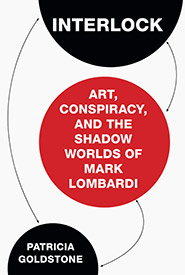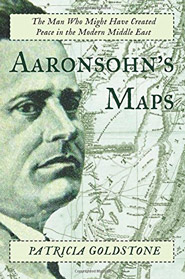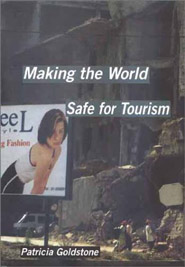Patricia Goldstone
author, playwright, journalist
Patricia Goldstone
author, playwright, journalist
Aaron Aaronsohn
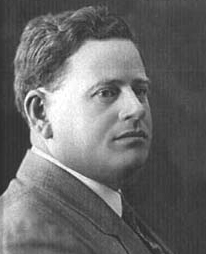
Aaron Aaronsohn
On May 15, 1919, Aaron Aaronsohn vanished without a trace. He was not only a remarkable Jew but probably one of the most extraordinary figures of the 20th century — a world-renowned scientist, a diplomat and a spy whose daring exploits enabled British General Edmund Allenby to capture Jerusalem, a turning point in WWI generally attributed to T.E. Lawrence.
Allenby himself wrote that Aaron’s death deprived him “of a valued friend and of a staff officer impossible to replace. His death is a loss to the British Empire and to Zionism, but the work he has done can never die.” Aaron’s years of solitary geological explorations resulted in finding the ancient ‘Way of the Wells’ where water could be located underground in artesian and other sources. This sped up Allenby’s plans significantly because, previously, water was being carried by rail from Egypt.
Brigadier Walter Gribbon said that Aaron was responsible for saving the life of 30,000 British troops, while William Ormsby-Gore, 4th Baron Harlech, the British liaison officer to the Zionist Commission in Palestine, wrote that Aaron and his siblings were “the most valuable nucleus of our intelligence service in Palestine during the War. Nothing… will repay the work they have done and what they have suffered for us.”
I first ran across a mention of Aaron Aaronsohn and his beautiful and courageous sister Sarah, who may have been the only woman Lawrence ever loved, when I was researching a book on water and conflict in the Middle East. It was only a small mention but it drew my attention because he seemed to be such an enormous figure. I was struck by the silence around him. Far ahead of his time, he foresaw that water, not oil, would one day become the most important commodity in the Middle East.
Aaron’s most important accomplishment was far more controversial than spying. He compiled a plan for Palestine’s national borders that included all the headwaters of the Jordan River.
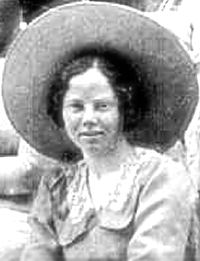
Sarah Aaronsohn
He believed passionately that there could be no viable long-term future for the new country without a partnership between Arabs and Jews. Water-sharing, he believed, was the best basis for such a partnership and his plan could have prevented decades of conflict to come. But he paid for his devotion to the new nation with his life – and with decades of oblivion instead.
Uncovering the mystery of Aaron Aaronsohn is to understand why Israel and Syria still cannot agree on the Golan Heights, how their disagreement led to war with Iraq in 2003, and how the only comprehensive Middle East peace solution to date – a pipeline which would bring water from Turkey to Saudi Arabia – bears a striking similarity to Aaronsohn’s most visionary imaginings.
In the new paperback edition of Aaronsohn’s Maps, I follow what has become somewhat misleadingly known as the Peace Pipeline and concomitant efforts to detach Syria from the “Shi’ite Crescent” of Iran, Hezbollah, and Hamas into the 2011 Syrian civil war. I uncover a nightmarish flip side to Aaronsohn’s dream of developing water to build peace – the weaponization of water by ISIS as a means of first subduing and then controlling the Middle East. I note the curious coincidence that ISIS tacticians appear to have made an extensive study of the Peace Pipeline and have targeted rivers, canals, sewers, and desalization plants on the premise that whoever controls increasingly scarce water supplies in the region – where the longest and most severe drought in fifty eyars is considered a major factor in Syria’s political destabilization—will control the outcome of the conflicts in both Syria and Iraq. I note another coincidence which, more curiously still, brings Aaronsohn’s Maps into the confusion of funding streams for terrorism that Mark Lombardi was exploring at the time of his death: In 2015, the London trial of a Swedish man accused of terrorism in Syria collapsed after it became clear that British intelligence had been arming the same rebel groups the defendant was charged with supporting.
-Patricia Goldstone
Footnote:
Born in 1876 in Fălticeni, Romania (some sources list his birthplace as Bacău, Romania), Aaron Aaronsohn emigrated with his family to Palestine when he was six years old. After studying agriculture in Grignon, France, he made his name as a botanist and agronomist, discovering triticum dicocoides, wild Emmer wheat, which he believed to be the mother of modern wheat.
In 1915, together with his brother Alexander and sister Sarah, among others, he founded the Jewish spy organization Nili, which gathered intelligence for the British in their fight against the Turks in Palestine.
In 1919, while advising on boundaries at the Paris Peace Conference, Aaron died in a suspicious plane crash over the English Channel on May 15 of that year.
Note: His name is frequently misspelled ‘Aaronson’ and ‘Aronsohn’; Aaronsohn is the correct spelling.
©2023 Patricia Goldstone ~ Designed by Mesa Multimedia
